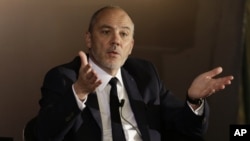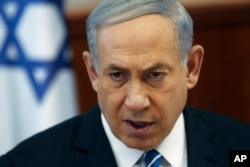To calm a diplomatic squall, the head of a French-owned mobile phone company on Monday said he’ll visit Israel, the target of pro-Palestinian global boycott campaign to pressure it to allow a Palestinian state.
Stephane Richard, chief executive of mobile phone company Orange, last Wednesday drew fire when he said his company would pull out of a deal with Israeli operator Partner Communications if it had the choice. "Believe me, I would cancel the contract tomorrow if I could," Stephane Richard said in Cairo on Wednesday, later insisting his comments were based on finances, not politics.
Israeli Prime Minister Benjamin had reacted angrily, inviting Richard to Israel to explain himself.
Over the weekend, both men softened their rhetoric, casting the fray as a misunderstanding. And on Monday, according to The Economic Times, an Orange company spokesman said Richard would “go to Israel soon and … provide all the necessary clarifications to end this controversy and reaffirm the group’s commitment.”
Former French President Nicolas Sarkozy, visiting Monday in Israel with the country’s president, Reuven Rivlin, denounced any boycott of Israel. “I would like to say how thoroughly we condemn, without equivocation, any backing for a boycott aimed at Israel's democracy," Sarkozy said in French while meeting with Rivlin, Reuters reported.
France has a 25 percent stake in Orange, which Sarkozy did not cite by name.
France’s Foreign Minister Laurent Fabius also had intervened in the debate, saying Paris does not support a boycott. Fabius said that Richard could define Orange's business strategy but that a boycott would not be recognized under international law.
Combatting boycott
Israel is stepping up its battle against a global movement to boycott Israeli businesses that operate in the occupied Palestinian territories. Analysts say support for the BDS boycott movement appears to have increased after Netanyahu, while seeking re-election in March, pledged never to allow a Palestinian state. He has since softened his comments.
The BDS Movement – for boycott, divestment and sanctions – aims to financially pressure Israel to end the occupation and settlement of land it captured in 1967.
The movement, which began by 2005, is gaining momentum and has become increasingly effective, said Sharif Nashashibi, a London-based Middle East analyst and journalist.
"The Palestinian Authority is taking Israel to the International Criminal Court," he said. "As welcome as worldwide recognition is, there has to be accompanying pressure on Israel to make that state a reality."
Netanyahu said the Israeli government will oppose against any attempt to harm Israel with lies and false accusations and boycotts.
"We will harness forces in this country and around the world, will smash the lies of our enemies and struggle for the right of Israel to live in peace and security – to live at all," Netanyahu said at a weekly cabinet meeting Sunday, The Jerusalem Post reported.
Losing patience?
Israel’s international allies have largely criticized the boycott movement – but they are losing patience with Netanyahu, said Yossi Mekelberg, professor of International Relations at Regents University London.
"I think it’s gradually dawning on Israel that there is out there – within international organizations, in governments, the European Union, even in the United States – a lot [who] think that the Netanyahu government is blocking peace through expanding settlements," Mekelberg said. "And hence, they think about what can be done in order to enhance the chance of a peace agreement."
They concluded they should economically target Israeli settlements and products, such as software, toys, produce, baked goods, tea and cosmetics.
While it’s difficult to determine the full economic impact, Israel’s Maariv newspaper estimated last year that the boycott of Israeli settlement products settlements had cost about $30 million.
U.S. President Barack Obama said earlier this month that, after Netanyahu’s comments during his March re-election campaign, the international community doubts Israel is serious about a two-state solution.
"Then, it becomes more difficult to argue with those who are concerned about settlement construction, those who are concerned about the current situation," Obama said. "It's more difficult for me to say to them, 'Be patient, wait, because we have a process here.'"
Israel blames Palestinian militants for blocking any peace process. Israeli aircraft struck the Gaza Strip Sunday in response to rocket fire that hit southern Israel.
Some information for this report was contributed by Reuters.





